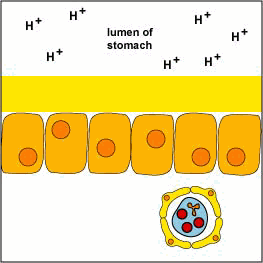Helicobacter
pylori, by means of its flagella, is able to swim through the mucus layer
of the stomach and adhere to the epithelial cells of the mucous membranes.
The bacterium then releases toxins that lead to excessive production of cytokines
and chemokines. The cytokines and chemokines, in turn, result in a massive
inflammatory response. Leukocytes leave the capillaries, accumulate at the
area of infection, and discharge their lysosomes for extracellular killing.
This not only kills the bacteria, it also destroys the mucus-secreting mucous
membranes of the stomach. Without this protective layer, gastric acid causes
ulceration of the stomach.
